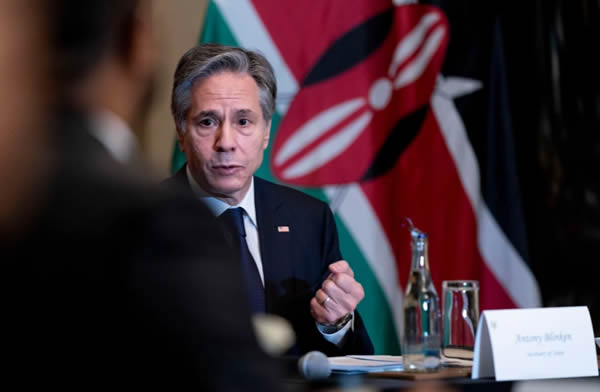
The United States, Israel’s staunchest supporter in its war against Hamas militants, said Sunday that the Israeli military is failing in its announced intention to protect as many Palestinian civilians as possible who are trying to flee Israeli attacks in the Gaza Strip.
“It’s imperative that civilians be protected,” Secretary of State Antony Blinken told CNN’s “State of the Union” show. He said Israel had fallen short in protecting Palestinian civilians as it continues its offensive against the militants in the narrow enclave along the Mediterranean Sea.
The top U.S. diplomat said, “What we’re not seeing are deconfliction times so [more humanitarian] aid can be brought in” to Gaza and “clarity of demarcation” lines for areas where Israel will not attack so civilians can find safe refuge.
The U.N. General Assembly will hold an emergency meeting Tuesday to vote on a draft resolution demanding an immediate humanitarian cease-fire in Gaza. Riyad Mansour, the Palestinian ambassador to the U.N., told The Associated Press that it’s similar to the Security Council resolution the U.S. vetoed Friday.
Intense fighting
After an intense 24-hour combat, Israeli tanks rolled into the center of Khan Younis, the main city of the southern Gaza Strip Sunday.
The Israeli military said it had struck more than 250 targets in the past 24 hours, including some in the south near Khan Younis, but also the Shajaiya neighborhood of Gaza City in the north.
It also said dozens of Hamas fighters had surrendered, encouraging more of them to do so, but the Palestinian militant group denied this, calling the claim “false and baseless.”
Israel has vowed to eradicate Hamas, a U.S.-designated terrorist group, after Hamas militants invaded southern Israel in a surprise terror attack on Oct. 7, killed about 1,200 people and captured about 240 hostages. Hamas, which has ruled Gaza since 2007, is still holding about 140 people.
The Hamas-run health ministry says that nearly 18,000 people, mostly women and children, have been killed in the Israeli air and ground offensive in the last seven weeks.
The World Health Organization’s executive board was meeting Sunday to discuss the health situation in Gaza.
WHO Director-General Tedros Adhanom Ghebreyesus described the health situation in Gaza as “catastrophic,” adding it will be almost impossible to improve.
The 34-member board passed an emergency WHO motion by consensus to secure more medical access in the enclave.
Palestinian officials have also described a disastrous health situation in Gaza, where Israel’s assault has left most of the population homeless, with little electricity, food or clean water, and a medical system facing collapse.
“I must be frank with you: These tasks are almost impossible in the current circumstances,” Tedros said. Still, he commended countries for finding common ground, saying it was the first time any U.N. motion had been agreed on by consensus since the conflict began.
Mustafa Barghouti, a Palestinian politician who heads the Union of Palestinian Medical Relief Committees with 25 teams working in Gaza, said, “Half of Gaza is now starving.”
He said 350,000 people had infections, including 115,000 with severe respiratory infections. They also are lacking warm clothes, blankets and protection from the rain, he said.
EU foreign ministers
On Monday, European Union foreign ministers will consider possible options in response to the Middle East crisis, including a crackdown on Hamas’s finances and travel bans for Israeli settlers responsible for violence in the West Bank, Reuters reported.
At a meeting in Brussels, ministers from the bloc’s 27 countries will also hear from Ukrainian counterpart Dmytro Kuleba as they discuss future security assistance to Kyiv.
While EU officials insist helping Ukraine repel Russia’s invasion remains a top priority, the eruption of the war between Israel and Palestinian militant group Hamas has forced the bloc to focus anew on the Middle East.
U.S. President Joe Biden has asked Congress for a $110 billion package of wartime funding for Ukraine ($61.4 billion) and Israel, along with other national security priorities. But on Wednesday, Republicans in the U.S. Senate blocked the legislation, saying major U.S. border security changes were needed.
The war also has exposed long-running and deep divisions on the broader Israeli-Palestinian conflict among EU countries.
But the ministers will try to find common ground as they consider a discussion paper from the EU’s diplomatic service that outlines a broad range of possible next steps.
Hamas is listed by the U.S. and European Union as a terrorist organization.
United Nations correspondent Margaret Besheer to this report. Some material in this report came from The Associated Press, Reuters and Agence France-Presse.
Source: voanews.com























